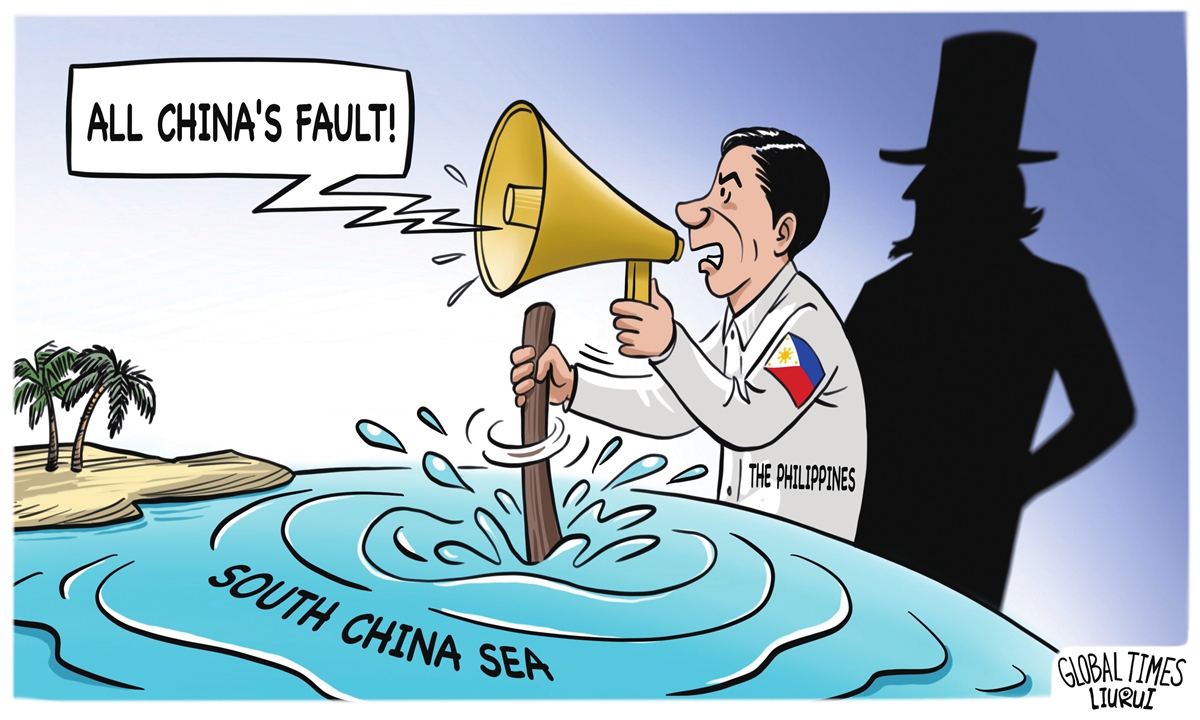
Illustration: Liu Rui/GT
On Wednesday, the Philippine Coast Guard (PCG) held a press conference, condemning "China's use of brute force to assert its illegal claims." Experts stated that smearing China's "fatal" attacks in the South China Sea has become a common tactic used by the Philippines to provoke incidents. The PCG press conference was a political show that fully demonstrates the political scheme of the Philippines to provoke its dispute in the South China Sea.
According to the Philippine media, PCG spokesperson Jay Tarriela stated that the China Coast Guard (CCG) used a "very fatal" water cannon pressure in a recent incident at the Huangyan Dao, signaling an escalation of China's "aggression" toward Philippine vessels. This statement was in response to the incident on Tuesday, when the CCG took action and expelled Philippine vessels after the latter ignored multiple warnings from the Chinese side. China has already responded to this incident.
Gan Yu, a spokesperson for the CCG, said on Tuesday that after Philippine vessels persisted in intruding into the waters off Huangyan Dao despite repeated dissuasion and warnings from China, the CCG's "acts were professional, legitimate, and lawful." China holds indisputable sovereignty over Huangyan Dao and its adjacent waters, as well as sovereign rights and jurisdiction over relevant waters. "What the Philippines did has violated China's sovereignty and seriously violated international law and the basic norms governing international relations," he said, urging the Philippine side to immediately stop the infringing action.
Since last year, Philippine vessels have repeatedly intruded into the waters near Huangyan Dao. It is obvious that the provocative actions of the Philippine government are premeditated and organized acts of infringement on China's sovereignty. China has always maintained a calm, restrained, and regular law enforcement activity to safeguard territorial sovereignty, but the Philippines deliberately portrays China as "bullying the small with the big" in an attempt to establish an image as a "victim". The Philippines' provocative actions in the South China Sea have formed a routine that includes on-site provocation and staged collisions, followed by playing the victim to deceive international public opinions.
The essence of the South China Sea issue is a dispute over territorial sovereignty, but the Philippines is trying to manipulate concepts through cognitive warfare. Ding Duo, a deputy director of the Institute of Maritime Law and Policy at the China Institute for South China Sea Studies, told the Global Times that after provoking in the South China Sea, the Philippines often blurs the essence of the issue, pointing the finger at China as a big country "bullying" the Philippines, thereby inflaming extreme democratic sentiments domestically and further consolidating the US-Philippines alliance.
Recently, the Philippines conducted a series of joint exercises and patrols in the South China Sea with external forces such as the US. The Philippines, seeking more support from outside the region, has intensified its accusations against China, but its provocations have not delivered any substantial benefits. At the same time, the Philippine government is also facing many domestic issues in terms of people's livelihoods and the economy. Under pressure, the Philippine government is trying to stir up tensions in the South China Sea, creating an "enemy" as a tool to divert domestic conflicts. This press conference is more like a political show by the Philippine government, with political purposes behind it that involve hijacking Philippine public opinions and the Philippines' South China Sea policy.
The incident on Tuesday has nothing to do with the Filipino fishermen and their fishing activities in the Huangyan Dao area. Since the temporary special arrangements were agreed upon by China and the Philippines in 2016, fishing by Filipino fishermen in designated areas off Huangyan Dao was not an issue. Now the incumbent Philippine administration, out of its political agenda, hustles the fishfolks to the frontline of maritime disputes in the name of humanitarian assistance. This is what's truly sad.
The Philippine government is very clear that Huangyan Dao is not within Philippine territory. Ding stated that before 1997, the Philippines had never questioned China's sovereignty over Huangyan Dao, nor had it made any territorial claims over the island. The territorial boundaries of the Philippines have been confirmed by international treaties, and Huangyan Dao is not within Philippine territory. Since the 1970s, the Philippines has illegally occupied islands and reefs in the South China Sea. It is obvious that the provocative actions of the Philippine government in the waters near the island are premeditated and organized acts of infringement on China's sovereignty. The Philippines' attempt to unilaterally change the status quo is true "infringement and provocation."
Currently, there are rational voices in the Philippines calling for the South China Sea issue to be resolved through peaceful negotiations. However, it is regrettable that the PCG, immersed in a "victim" drama, and the Marcos government, which grips to expansionist tendencies, have damaged the understanding between China and the Philippines, greatly weakening the foundation of political mutual trust. If the Philippine government continues to "rely on the US for self-importance" on the South China Sea issue, willingly becoming a pawn in the US Indo-Pacific strategy, it will not only waste economic resources and increase unforeseeable risks, but also not gain any value.
Regardless of how the Philippines smears China, the fact that China is not the planner of risks in the South China Sea nor the instigator of disputes, but rather the maintainer of regional security and controller of crisis events, will not change.
